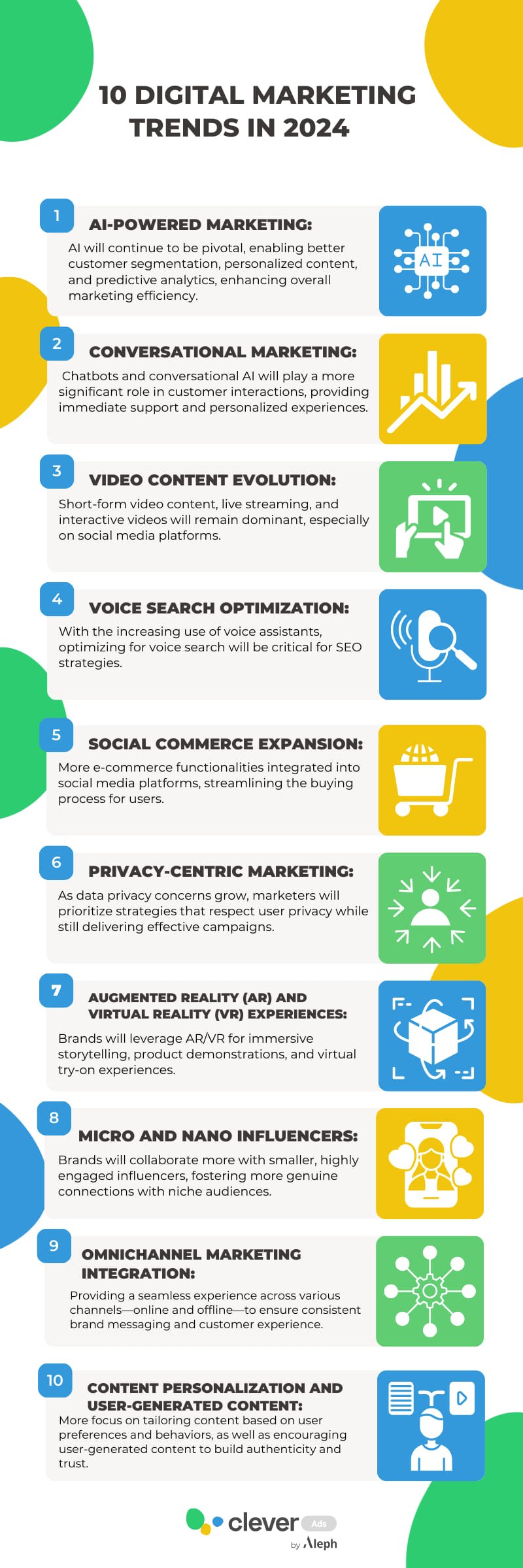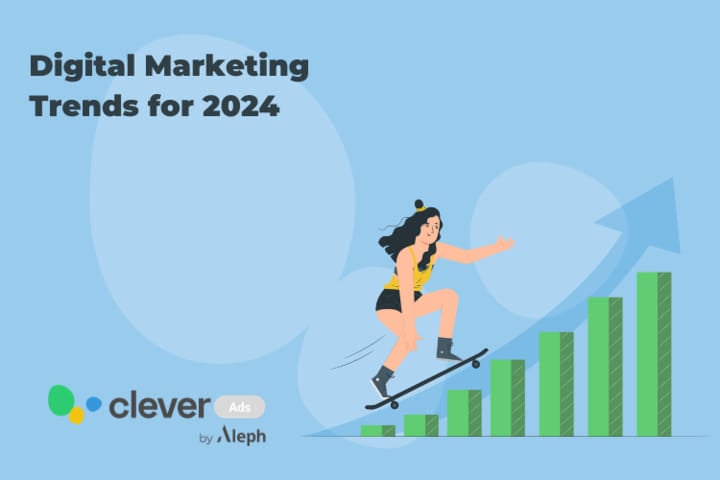Digital Marketing Trends for 2024
Regardless of what your business sells, it is critical to adapt to digital marketing trends. These become more and more relevant as the year progresses towards key dates such as Black Friday and Cyber Monday, so it is important to be constantly up-to-date on industry trends, as they are bound to change and evolve over the course of the year. For now, however, our experts have compiled a list of the top trends to look out for this year… let’s take a look!
-
- You’ll find more interesting marketing tips and articles on our Digital Marketing Blog. Continue reading to learn about digital marketing trends for 2024!
Social Media Marketing
TikTok holds the throne
TikTok remains the most powerful social network, especially when trying to reach younger audiences. In 2023, TikTok expanded its user base by 16% to over 1.6 billion users. It is safe to expect further growth in 2024, so if you aren’t currently running social campaigns on TikTok, now is the time! It continues to be the #1 digital marketing trend to follow, and increasingly is becoming a trusted platform that consumers pay attention to when making purchasing decisions.
Micro- and Nano-Influencers and UGC
Influencer marketing is no new trend in social media marketing and it’s not going to go anywhere in 2024. One trend that we will likely see within influence marketing is brands opting more and more to work with smaller micro- and nano-influencers (micro-influencers being creators with between 10,000 and 100,000 followers, and nano-influencers having less than 10,000 followers). Why choose to collaborate with creators with less reach? Micro- and nano-influencers’ smaller audiences are more engaged and more likely to occupy the same niche. Therefore, by collaborating with the right micro- or nano-influencers you can reach a larger number of potential clients within a smaller pool, while spending less money.
Generally, expect user-generated content (UGC) to become more and more important as brand-generated social media marketing becomes increasingly mainstream. This includes influencer marketing, of course, but also any efforts, such as a hashtag campaigns, that encourage all clients to take their experiences with your product or service to social media. Looking back, we can learn from expert examples like Apple’s #ShotoniPhone campaign. In 2024, expect smaller brands to draw up creative ways to encourage UGC and populate social media with ultra-native content related to their brand.
Social Commerce Expansion
As people spend more time on social media and build stronger connections with brands through social platforms, giving customers the option to make purchases on social media platforms will become increasingly important. Having a social commerce system is a great way to turn conversions in the moment, rather than directing clients to your site and adding an additional platform to the conversion funnel. Social commerce integration simplifies the purchasing process and makes it easy for customers to act quickly on the sentiments that social marketing projects. When paired with good social marketing, social commerce is an unstoppable way to turn conversions, and will become an increasingly important way to compete in this new age of Ecommerce.
AI-Powered Marketing
2023 was the year where artificial intelligence became a tangible reality in the lives of most people with the release of ChatGPT at the end of 2022. Considering the advancement of AI in the past year, we can expect 2024 to bring major changes to the world of digital marketing. Don’t let AI scare you! Knowing how to use AI to your advantage will allow you to drive traffic and conversions more efficiently and effectively.
Personalized Content with Enhanced Customer Segmentation
As with many other fields, the power of AI lies in its ability to analyze and provide insights on vast amounts of data. This is nothing new, however – Netflix, Amazon, and many other platforms have long been crunching user data to recommend the most relevant movies and consumer products to their clients. With AI becoming more advanced and accessible, insights gained from user interactions will become increasingly advanced, and marketing teams will be able to display the right ads with the right message in the right place at the right time to the right person with unprecedented confidence.
AI and Social Media
As social media continues to grow as a platform connecting businesses and consumers, social media will become an increasingly important treasure trove full of micro-interactions for AI to make sense of. Therefore, it is time to start thinking of social media not just as a way of creating brand awareness and promoting products and services, but as one of the best ways for you to better understand the messaging, branding, imagery, and services that appeal the most to different customer segments.
AI Chatbots and Conversational Marketing
The convenience of online shopping is the main reason why people are increasingly opting to shop online rather than in-person. One thing that is lost in the online shopping experience, however, is the on-hand help available in brick and mortar shops – where the retail clerk is there to help and answer questions throughout the customer journey, the E-commerce shop often falls short. In the past, bigger E-commerce stores with larger budgets have been able to fix this problem by employing online customer service in the form of real customer support agents or chatbots. With the advancement of these chatbots in terms of sophistication and affordability, we can expect chatbot assistants to become increasingly ubiquitous in the world of Ecommerce and an essential marketing tool to keep clients engaged and informed while online shopping.
In the above context, AI chatbots can be seen as a digital reproduction of in-person sales clerks. In reality, chatbots can be used for marketing purposes beyond when the client is actively shopping, such as in lead generation. When visiting any website for the first time you have probably encountered one of these chatbots which, through a series of quick questions, tries to get to know first-time clients and what they are looking for on a site. Chatbots will continue to be used in increasingly clever ways, such as in reviews and the implementation of loyalty programs.
Augmented and Virtual Reality (AR and VR)
As a new, physical technology, AR and VR have been slow and steady in their rise to popularity. As technology improves and consumers increasingly embrace this new technology, it is time to start thinking about how it will be used in the future of marketing. Virtual product demos and try-on experiences are a couple of futuristic ways that AR and VR are beginning to enhance the digital shopping experience.

Strategy: Consistency and Privacy
Consistent Brand Messaging
With the development of social media marketing, expansion to new platforms, and the advent of new technologies for marketing, it will be more important than ever for brands to maintain consistent brand messaging and customer experience. Customers will be interacting with your brand across a range of social media platforms, your online store, through chatbot interactions, and maybe even virtual reality. Creating a seamless customer experience is essential to good brand messaging and product marketing that makes customers trust and associate with your company.
Establishing Trust by Respecting User Privacy
The other key element in establishing customer trust is privacy. Much of modern marketing is made possible with small bits of client and user data that allow marketers to display the most relevant ads to the right groups of people. Users now are more educated than ever about their data privacy rights as well as scandals and breaches related to user data and, in response, are demanding greater transparency with respect to how their data is being used. In 2024, not only will it be more important to be transparent about your data policies, but also be ready to adapt to new regulations surrounding data use. For example, by late 2024, Google Chrome will join Firefox and Safari in eliminating third-party cookies. In keeping with the move towards greater protection of customer data, being as transparent as possible about your company’s use of user data will be one of the most important ways to earn your clients’ trust.





I agree
This article is very informative, updated and transparent.
What a useful information provided by this blog! It’s remarkable. Thanks for helping me out
Very informative article, thanks for sharing about new trends in digital marketing